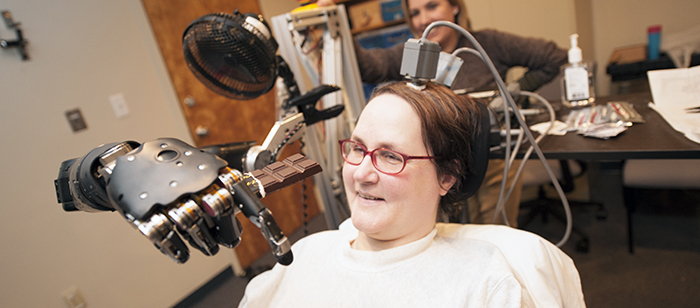Debate: Ethics of brain-computer interface technology

What ethical problems might advances in brain-computer interface technology create?
That’s the question that will be debated Monday evening as part of the UMBC BioCOM Ethical Debates (B-Ethical) series co-sponsored by the Biology Council of Majors and Philosophers Anonymous.
The event will take place from 7:30pm to 9:00pm on Monday, March 2 in room 104 of the ITE building (lecture hall 7) at UMBC.
One team will be lead by Professor Richard Wilson, a member of UMBC’s Philosophy department with a focus on applied ethics. LThe other team is headed by Kavita Krishnaswamy, a Ph.D. student from UMBC’s Computer Science and Electrical Engineering department whose dissertation research is exploring how robotics can help increase autonomy in daily living for people with disabilities. Kavita, who has a severe physical disability herself, will participate via a Beam Smart Presence robot. Also on the team is CSEE Professor Tinoosh Mohsenin whose research includes deep learning to interpret high-resolution multichannel electroencephalography data.
Some details from the B-Ethical post:
“The field of Brain Computer Interface (BCI) research has led to the engineering of a device system that allows you to convert your thoughts into action by using your brain’s neural activity: think controlling a robotic arm via electrodes that are placed on a brain that controls the arm with its thoughts.This revolutionary field in neuroscience has given hope to those who are severely disabled including but not limited to those who suffer from blindness, paralysis, and other debilitative physical disabilities. Hence, computer-brain interface technology has the potential and power to do incredible good.
Some note, however, the importance of recognizing the possibility for ethical wrongdoing. One such ethical question surrounding this field is the possibility for social stratification as a result of barriers such as cost. If brain enhancement does become effective and ubiquitous, there is the possibility that pressure to enhance one’s brain in order to keep up with rising competition, might leave some unable to access this enhancement because of financial barriers. Hence, this will not only widen the gap in society between the rich and the poor, but become dangerous, creating a social strata in which an intellectual elite armed with thought-controlled weapons would government the people. One could think of an army with capabilities such as night vision eyes, fingers that can fire bullets, humans made immortal by copying their genetic material into more resilient hardware, these endless possibilities ascend into the world of sci-fi as they are scary.”
Posted: February 26, 2015, 9:57 AM